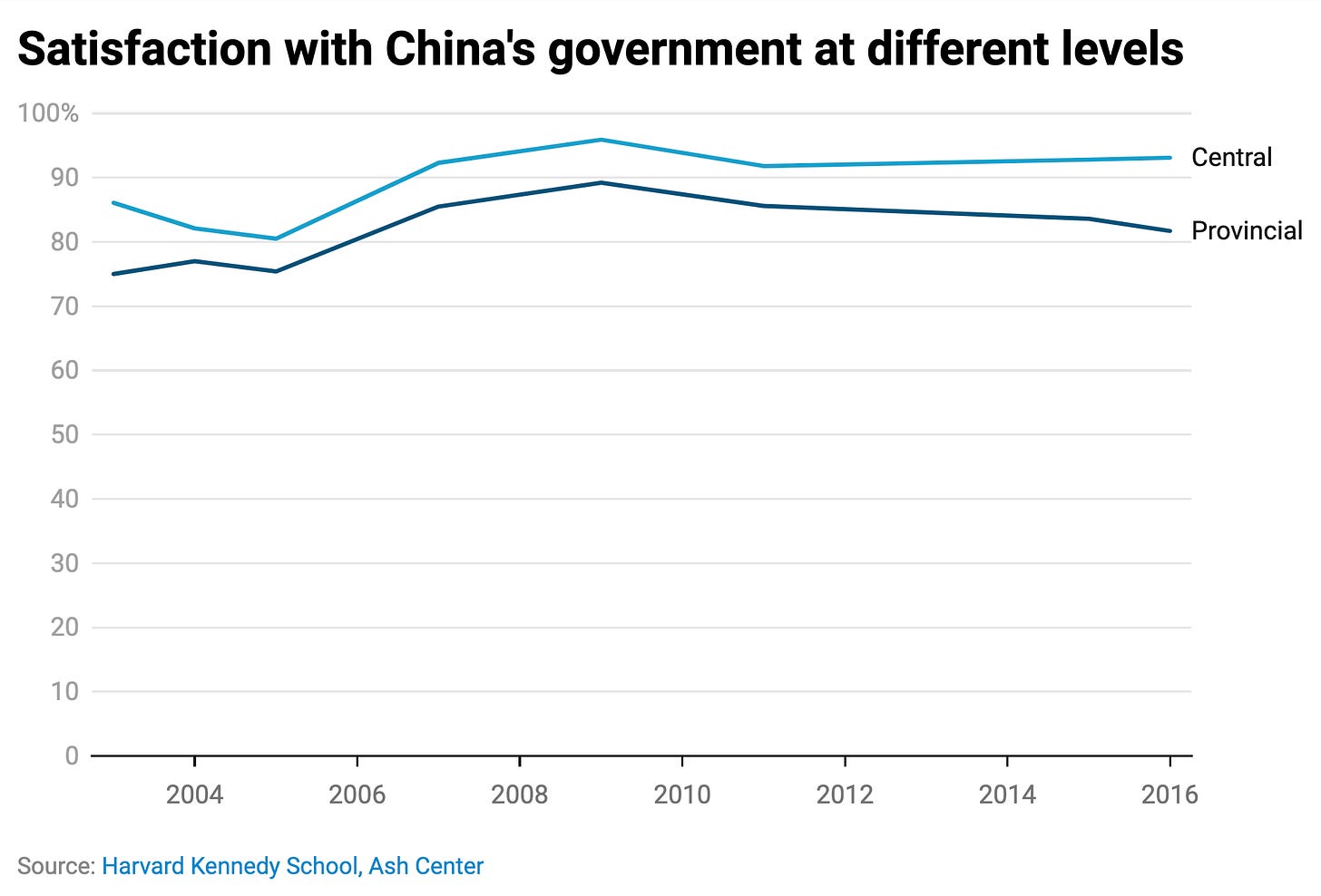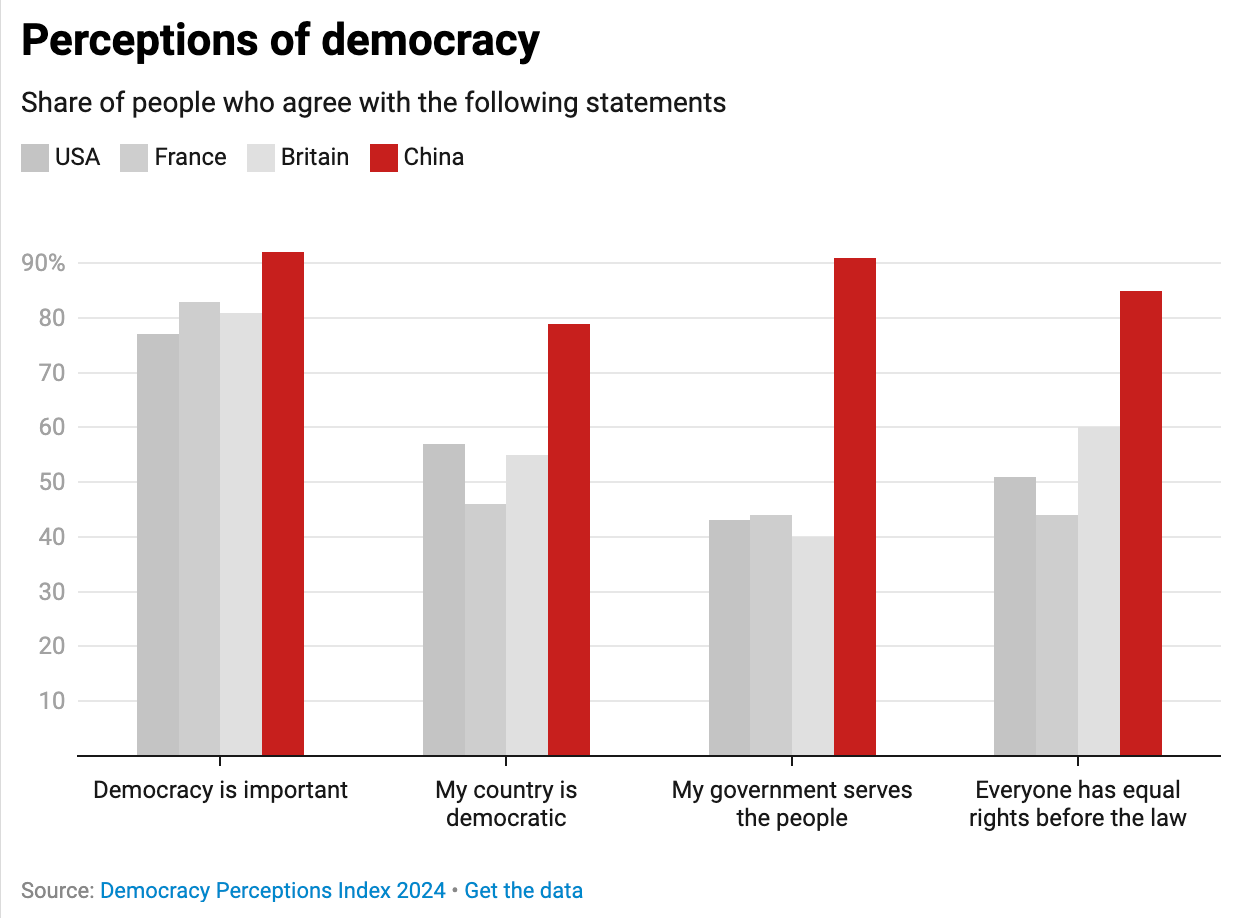Conventional narratives in the West claim that the government in China lacks popular legitimacy and only retains power through coercion. But existing evidence from the two main studies on this question – both conducted by established Western institutions – shows the opposite. These studies demonstrate that the government in China enjoys strong popular support, and that most people in China believe their political system is democratic, fair, and serves the interests of the people.
The first study is published by Harvard’s Ash Center for Democratic Governance and Innovation. The Ash Center operates what they describe as “the longest-running independent effort to track Chinese citizen satisfaction with government performance”. Regular surveys have been conducted since 2003. The most recent results were published in 2020, in a report titled “Understanding CCP Resilience: Surveying Chinese Public Opinion Through Time”.
This is not a pro-China publication. In fact, the Ash Center starts with the assumption that China is an authoritarian system dependent on coercion, and is therefore likely to face a crisis of public legitimacy. But the study’s actual results establish very different conclusions.
The authors summarize their results as follows. “We find that, since the start of the survey in 2003, Chinese citizen satisfaction with government has increased virtually across the board. From the impact of broad national policies to the conduct of local town officials, Chinese citizens rate the government as more capable and effective than ever before. Interestingly, more marginalized groups in poorer, inland regions are actually comparatively more likely to report increases in satisfaction. Second, the attitudes of Chinese citizens appear to respond (both positively and negatively) to real changes in their material well-being.”
The report finds that public satisfaction with the central government is extremely high. In 2016, the final year of data, it stood at 93%, having generally increased over time. Satisfaction with lower levels of government is somewhat lower but still very strong; for instance, provincial governments enjoyed 82% support in the final year of data.

The second study is published by the Alliance of Democracies (AoD), a Danish NGO founded by the former Secretary General of NATO and the former Prime Minister of Denmark. AoD partners with Latana, a market research firm based in Germany, to conduct annual surveys on democracy perception in more than 50 countries around the world. They have published the Democracy Perception Index report every year since 2019. It is the gold standard in the industry, produced by liberal institutions that certainly cannot be accused of having a pro-China bias. And yet the results on China are consistently striking.
According to the most recent report (2024), people in China have overwhelmingly positive views of their political system. 92% of people say that democracy is important to them, 79% say that their country is democratic, 91% say that the government serves the interests of most people (rather than a small group), and 85% say all people have equal rights before the law. Furthermore, China outperforms the US and most European countries on these indicators – in fact, it has some of the strongest results in the world. The figure below compares China’s results to those from the US, France and Britain. These results may help explain the high levels of satisfaction with government reported by the Ash Center.

The AoD study also assesses people’s perceptions of freedom of expression, and free and fair elections. Here too, China outperforms the US and most of Europe. When given the statement “Everyone in my country can freely express their opinion on political and social topics”, only 18% of people in China disagreed (compared to 27% in the US). And when given “Political leaders in my country are elected in free and fair elections”, only 5% in China disagreed (compared to 27% in the US).
One possible criticism is that people in China may be reluctant to say negative things about their government because they may fear repression. But the Latana methodology is explicitly designed to mitigate against this possibility. The AoD report states “In contrast to surveys conducted face-to-face or by telephone, the anonymity offered by Latana’s methodology may help reduce response bias, interviewer bias, and respondent self-censorship.” These methods appear to be effective. If China’s positive results are due to fear of repression, we would expect to see similarly positive results in countries that are regarded as having repressive regimes, but this does not occur. People living in such states do not hesitate to express critical opinions. For instance, in Russia only 50% of people said their country was democratic.
Many people are surprised by the AoD results for China because they believe China does not in fact have a democratic system. It is true that China does not have a Western-style liberal democracy, where voters elect the head of state every few years. But it does have its own system of democracy, which it refers to as a “whole-process people’s democracy”, with principles of democratic centralism and a unique party system. This system seeks to institutionalize popular engagement in the policy-making process to ensure responsiveness to people’s needs (see summaries here and here, and a podcast on this with US Professor Ken Hammond here). Direct elections occur at the two most local levels of the National People’s Congress, with elected deputies then voting for those who will serve in the higher levels.
Whatever one might think of this system, it is clear that most people in China seem to like it.
The results of the AoD study suggest that what matters most when it comes to people’s perceptions of democracy is not whether their country has Western-style elections, but whether they believe their government acts in the interest of most people. In many Western countries that have regular multi-party elections, people do not believe that their governments act in the interests of most people, and do not believe their countries are democratic. In China, people overwhelmingly perceive that their government acts in the interests of most people, and this may be key to high democracy perception there.
This result is not particularly surprising, given that CCP came to power through a popular revolution that enjoyed mass support from peasants and workers, with the explicit objective of improving the lives of the oppressed majority. While China has experienced several major policy changes over time, including a process of market liberalization in the 1980s that caused high inflation and widespread protest, over the past decade the government has taken strong steps to reduce poverty and ensure universal access to good housing, food, healthcare and education.
None of this is to say that China’s political system does not have problems and internal contradictions that must be overcome. It does, just as all countries do – nobody could reasonably claim otherwise. But these studies point to an important reality that should be grappled with: that the Chinese people have a much higher regard for their political system than people in the West tend to assume.

No comments:
Post a Comment